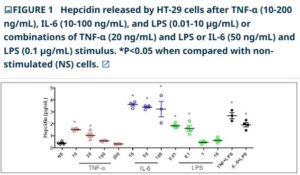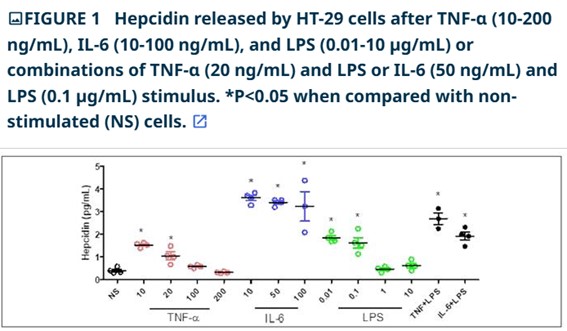HIGHLIGHTS
- Increased hepcidin expression has previously been detected in the gastrointestinal tract, H. pylori-infected gastric mucosa and experimental models of colitis.
- Understanding the gastrointestinal functions of hepcidin was our goal.
- In this in vitro approach, we showed that hepcidin has a dual role. It is capable of isolating ROS and IL-8 production but is protective when cells are stimulated with LPS, reducing IL-8 production and NF-KB translocation.
- Hepcidin may play a beneficial local role in modulating the gastrointestinal inflammatory response.
ABSTRACT – Background
: Hepcidin’s main function is to control iron availability to hematopoiesis. However, it has been shown that hepcidin may have an additional role in intestinal inflammation, as intestinal cells and leukocytes increase the production in experimental colitis and Crohn’s disease.
Objective: Using an HT-29 cell as a model, we investigated the role of hepcidin in intestinal inflammation.
Methods: The ability of HT-29 cells to produce hepcidin was evaluated after stimulus with IL-6, TNF-α, and lipopolysaccharide (LPS) for 24 h. Experiments were performed in the presence of stat-3 or IκBα phosphorylation inhibitor. The release of IL-8 by HT-29 cells was evaluated after hepcidin stimulus in the presence or absence of ferroportin (FPN) antibody. Nuclear factor (NF) κB translocation and reactive oxidative species (ROS) production in response to hepcidin were also studied.
Results: HT-29 cells can produce hepcidin under IL-6, TNF-α, and LPS stimulation. The Stat-3 inhibitor reduces hepcidin production induced by IL-6, and the IκBα inhibitor reduces hepcidin production by all stimuli tested. IL-8 is produced by HT-29 cells in response to hepcidin, and the FPN antibody did not modify IL-8 release. Il-8 production induced by hepcidin was NFκB dependent, but when cells were co-stimulated with LPS, IL-8 release, and NFκB translocation were inhibited, and HPN antibody reduced it. Hepcidin increases ROS production by HT-29 cells.
Conclusion: We used HT-29 cells to demonstrate that hepcidin is produced at low levels in response to inflammatory stimuli. The hepcidin action is dual in HT-29 cells, performing a proinflammatory action by producing ROS and IL-8 under physiological conditions but an anti-inflammatory action by reducing IL-8 release and NFκ-B activation when LPS is present, suggesting that hepcidin has a modulatory role in intestinal inflammation.
.
AUTORES
PIXIOLINE, Michelle CHRISTOFOLETTI, Camila Rubia CONSTANTINO, Julia Aun MACEDO, Juliana Alves GAMBERO, Alessandra



